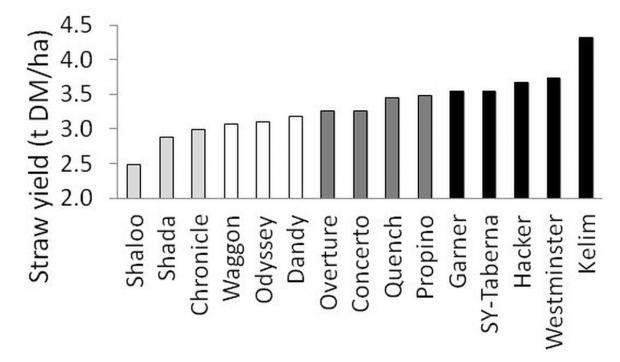The recently published Cereal Recommended List for Northern Ireland 2014 provides a comprehensive guide to varieties best suited for use locally.

It is based on trials carried out by the Agri-Food and Biosciences Institute (AFBI) on behalf of DARD as part of the HGCA UK Recommended List trialling system and all the data presented in this article are based on variety performance in Northern Ireland. The yields of recommended varieties and other locally available varieties are presented in Table 1.

The better the disease resistance profile of a variety, the smaller the yield loss due to disease. Disease resistance and other important agronomic characters of the listed varieties are discussed below. Also included is a chart (Figure 1) showing the straw yields of current spring barley varieties. AFBI’s Plant Testing Station at Crossnacreevy is the only research institute in the UK and Ireland that routinely measures straw yields in variety trials.
Spring barley.
There are six fully recommended varieties for 2014. Overture is now the highest yielding of these, closely followed by new addition Garner. Both have good disease resistance and quite good standing power but Garner has larger grain and higher straw yields. Odyssey and Propino (another new addition to the Northern Ireland list) - both give 104% of treated yields but Odyssey loses less yield than Propino when untreated. Propino also has large grain. Quench and Concerto continue to be fully recommended but Concerto loses 23% of its treated yield when untreated, mainly due to it's below average resistance to Rhynchosporium. Concerto does, however have better grain quality than Quench which tends to have small grain with low specific weight.
There are four new provisional varieties included in 2014. Hacker and Shada match each other in terms of yield – both giving 111% treated. Hacker has small grain with reasonable specific weight whereas Shada has large grain but low specific weight. Both have good disease resistance profiles and similar straw strength.
Hacker, however, gives very high straw yields and is intermediate to ripen whilst Shada has low straw yields and is later ripening. Shaloo gives slightly lower treated yields than Hacker and Shada but has better resistance to Rhynchosporium and so loses less yield when untreated. Shaloo has both good specific weight and very large grain. Kelim gives lower yields than the other new provisional recommendations but it is the first variety that has out-yielded Westminster’s straw yields. Kelim also has large grain with reasonable specific weight, quite good disease resistance but is late ripening.
SY Taberna and Westminster remain on the list but are becoming outclassed. Westminster still has superior grain quality, very high straw yields (although these have now been eclipsed by Kelim) but is late to ripen. SY Taberna gives good yields, has reasonable grain quality, quite good disease resistance and straw strength and is early ripening. Chronicle, Waggon and Dandy are also grown locally. Chronicle is a good all-rounder. Waggon, though no longer recommended, is also a good performer but has very poor resistance to Rhynchosporium. Dandy is still popular with some growers, but gives 20% lower treated yields than the highest yielding varieties on the 2014 list.
Spring Oats:
Canyon and Firth remain fully recommended for general use. Firth has higher kernel content and is still the most popular milling spring oat, whilst Canyon has better disease resistance and a lower yield penalty when untreated. Two new provisional recommendations, Monaco and Conway, have quite different characteristics.
Monaco gives very high treated yields, but with poor resistance to mildew, it can potentially lose 17% of its yield if untreated. It also has very low specific weight and is not suitable for milling because of this. Conway has good grain quality, good yields and good disease resistance. Husky has now become outclassed due to declining yields relative to other varieties.
Spring wheat:
This year the spring wheat varieties more suited for Northern Ireland have been highlighted in the Descriptive List. Granary still out-yields all other spring wheat varieties, giving 110% of treated controls. It is the only variety that has both large grain and high specific weight. It also has better disease resistance than the other varieties listed. Trappe and Sparrow both give good yields.
Trappe has very small grain and both have high specific weight. Sparrow, like Granary, is late to ripen, although this has little impact in a whole-crop situation. All varieties have few problems with straw strength and there has been little evidence of lodging in spring wheat trials. Granary has slightly stronger than average straw, whilst Ashby’s straw is slightly weaker than average.
Details of all the varieties in trial in 2014 are given on the AFBI website. Further advice on variety performance can be obtained by contacting the DARD CAFRE Crops Development team. The cereal variety team AFBI at Crossnacreevy welcomes growers’ comments on varieties and how they perform on-farm.
by Lisa Black and Ethel White, AFBI Crossnacreevy, Plant Testing Station, Crossnacreevy, Belfast
Notes to editors:
AFBI carries out high-quality technology research and development, statutory, analytical, and diagnostic testing functions for DARD and other Government departments, public bodies and commercial companies.
AFBI's Vision is “Scientific excellence in Northern Ireland … serving the world”.
All media enquiries to AFBI Press Office
Latest news
- AFBI Hillsborough host AERA committee 27 March 2025
- The Omics Days Conference 27 March 2025
- Resilience, Sustainability and Innovation survey 03 March 2025
- AFBI led Project Launched to Promote Sustainable Dairy Farming across the UK 18 February 2025
